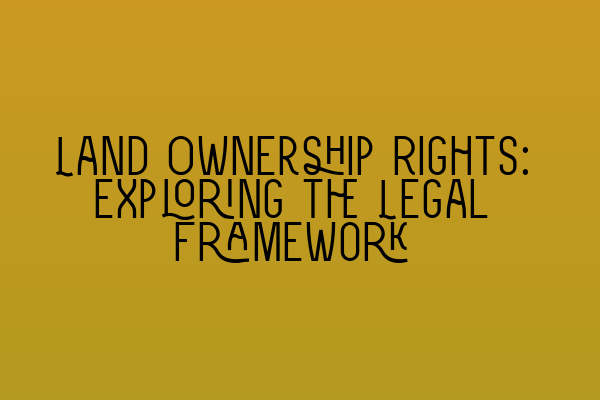Land Ownership Rights: Exploring the Legal Framework
When it comes to land ownership, understanding the legal framework is crucial. Whether you are buying a property, considering a lease, or dealing with disputes, having a grasp of your rights and obligations is essential. In this article, we will delve into the intricacies of land ownership rights, providing you with valuable insights into the legal aspects of property ownership.
The Basics of Land Ownership
Before we delve into the details, let’s start with the basics. Land ownership refers to the legal rights an individual or entity has over a piece of land. These rights typically include possession, use, and the ability to transfer or sell the land. It is important to note that land ownership does not necessarily mean ownership of what is built on the land, such as buildings or structures. These may be subject to separate ownership rights or restrictions.
Land ownership in the United Kingdom is governed by various laws and regulations. The legal framework for land ownership consists of both statutory laws and common law principles. Statutory laws, such as the Land Registration Act 2002 and the Law of Property Act 1925, provide the foundation for land ownership, while common law principles set precedents and guide judicial decisions.
Freehold Ownership
Freehold ownership is the most complete form of land ownership. When you own a property freehold, it means you have absolute ownership and control over both the land and any structures on it. Freehold ownership grants you the right to occupy, use, develop, and sell the land as you see fit, subject to any applicable planning regulations or legal restrictions.
One crucial advantage of freehold ownership is that it is generally considered a perpetual interest, meaning there is no time limit or expiration date on your ownership. This provides a level of security and stability for property owners, as they can pass on the property to future generations or sell it without any encumbrances.
If you are preparing for the SQE 1 exams, it is important to familiarize yourself with the legal concepts surrounding freehold ownership. Practice exam questions can provide you with an opportunity to test your knowledge and identify any areas that require further study. You can find SQE 1 practice exam questions here.
Leasehold Ownership
Leasehold ownership, on the other hand, involves a lease agreement between the landowner (freeholder) and the occupier (leaseholder). In this arrangement, the leaseholder has the right to occupy and use the property for a specified period, as outlined in the lease agreement. The lease agreement contains terms and conditions regarding the lease duration, rent, and rights and responsibilities of the leaseholder and freeholder.
Leasehold ownership is commonly found in properties such as apartments, flats, and some commercial premises. While leasehold ownership provides the occupier with a certain level of security and control over the property, it is important to understand the terms of the lease agreement and any associated ground rent or service charges.
If you are interested in preparing for the SQE 1 exams, you may find it useful to take practice mocks. These mocks can help simulate the exam environment and assess your knowledge and readiness. Practice mocks for FLK1 and FLK2 can be accessed here.
The Role of Land Registration
In England and Wales, land registration plays a vital role in the legal framework of land ownership. The Land Registration Act 2002 established a system for registering land and property interests with the Land Registry. The Land Registry maintains a register of land and property ownership, providing a reliable record of legal rights and restrictions.
Land registration not only protects the rights of landowners but also facilitates the smooth transfer of property. When you purchase a property, the transfer of ownership is typically completed through the registration process. This ensures that the new owner’s rights are properly recorded and recognized.
For individuals preparing for the SQE 2 exams, having a solid understanding of land registration and its implications is crucial. SQE 2 preparation courses can provide you with comprehensive guidance and resources to enhance your knowledge and exam performance. You can explore SQE 2 preparation courses here.
Resolving Land Ownership Disputes
Unfortunately, disputes over land ownership can arise due to various reasons, such as boundary disputes, adverse possession claims, or conflicting rights of way. Resolving these disputes requires a thorough understanding of property law and the ability to navigate the legal process effectively.
If you find yourself involved in a land ownership dispute, seeking professional legal advice is essential. A property law solicitor experienced in land law can assess your case, provide expert guidance, and represent your interests in negotiations or litigation.
Conclusion
Understanding the legal framework of land ownership is crucial for anyone involved in property transactions or disputes. Whether you are a freeholder, leaseholder, or dealing with land-related issues, having a solid grasp of your rights and obligations will ensure you navigate the complexities of property law confidently.
For individuals preparing for the SQE 1 or SQE 2 exams, engaging in exam-focused preparation is key. Practice exams, both multiple-choice questions and mocks, can help you assess your knowledge, identify areas for improvement, and boost your overall exam performance. SQE 1 preparation courses can equip you with the necessary tools and resources to excel in the exams. You can explore SQE 1 preparation courses here.
Stay informed, stay prepared, and stay confident in your understanding of land ownership rights!
For more information on SRA SQE exam dates, visit here.
